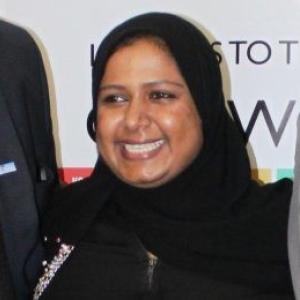Cape Town – In delivering this year’s annual 12th Desmond Tutu International Peace Lecture, the Deputy Secretary-General of the United Nations, Amina J. Mohammed, last night reminded her audience that as the world continues to mourn the late Archbishop’s loss, we “celebrate his legacy, which has never been more relevant in our world of great pain”.
She exalted the late Archbishop Tutu’s leadership qualities, describing him as a civil servant “who served throughout his life as a towering global figure for peace and an unwavering voice for the voiceless.” He stood above all for courageous hope and healing, based on principles rooted in pragmatism, she added.
This year’s lecture, under the theme, A Vision for Hope and Healing in a Time of Crisis, marked the first posthumous in-person address following the passing of Archbishop Tutu last year. Other leaders who gave previous lectures include the former South African first lady and human rights activist, Gracá Machel, the late and former UN Secretary-General Kofi Annan and former President of Ireland, Mary Robinson.
The lecture series, organized by the Desmond and Leah Tutu Legacy Foundation, aims to foster a meaningful dialogue on healing and reconciliation as South Africa strives to rise above its fractured past and current challenges including the Covid-19 pandemic, climate change and gender-based violence – severe issues that threaten the achievement of the Sustainable Development Goals and the Agenda 2030.
“Our world is in crisis with Africa left behind, yet again,” the Deputy Secretary-General lamented, “Nearly three years after the start of the Covid-19 pandemic, nations across the world, particularly African countries, face a multitude of cascading and compounding crises”.
These included increased poverty, hunger, lack of access to healthcare and quality education and thus leading to greater inequalities while social cohesion is fraying, and xenophobia, nationalism, hate speech and radicalization are on the rise, she added.
“However, it doesn’t have to be this way,” Ms. Mohammed reminded her audience.
“Our planet is packed with the resources we need to thrive, plentiful food and water, and boundless renewable energy. These are unique, irreplaceable resources that must be treasured, protected and handed down from generation to generation.”
Speaking on the UN Agenda 2030 and the African Union’s Agenda 2063, the Deputy Secretary-General described the alignment of the two agendas as “a pathway to a world that cherishes human dignity; a world free of poverty, hunger, violence and injustice.”
Ms. Mohammed encouraged people to follow in the footsteps of the late archbishop, in pursuing education as he believed that “education is the most powerful tool that a person can receive to ensure their independence, self-sufficiency and equality.” Archbishop Tutu was a teacher by profession during his early years.
The Deputy Secretary-General noted that the late anti-apartheid activist embodied values of peace, which still resonate today as the archbishop “understood that peace, in its broader conception, can only be achieved if we approach humanity as a community in which – as in any African village – everyone takes care of each other.”
The full address by the Deputy Secretary-General, Amina Mohammed can be accessed here.
Photo’s can be accessed here.
- ENDS -
For further information, please contact Ntombenhle Shezi, Advocacy and Communications Manager, Desmond and Leah Tutu Foundation at ntombenhle@tutu.org.za or +27 21 552 7524; or Zeenat Abdool, Associate Public Information Officer, UN South Africa at abdool@un.org or +27 82 778 8080.


















